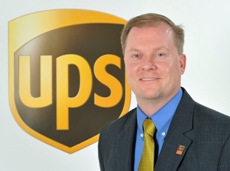UPS will target the booming B2C parcels markets in Europe and around the world with ‘AccessPoint’ retail outlets offering collection and drop-off services for busy consumers who shop online,
a senior executive told CEP-Research today as the UK network was officially launched and withGermany scheduled for this summer.Joe Mozzali, vice president of strategy, UPS Europe, declared: “B2C is providing tremendousgrowth opportunities. It’s about providing more solutions. This is the start of the globaljourney.” The B2C parcels sector is booming on the back of the e-commerce surge, with online salesforecast to increase 13-15% in the US and Europe over the next five years, according to UPS.
UPS is using the award-winning technology of Kiala, the European B2C delivery firm that itacquired last year, combined with its own transportation and delivery capabilities to create a “seamless” offering for domestic and cross-border e-commerce through a new ‘Business to Retail’(B2R) service.
“We see Kiala as a technology company and as leading in collection points. We view Kiala as aglobal concept and it can be scaled across the world,” Mozzali declared. The Belgian-based firm haddeveloped leading capacity management systems for the B2C delivery business, he noted.
Kiala, with an award-winning technology platform, already had an established network of morethan 6,500 retail locations in France (4,500), the Netherlands, Belgium, Luxembourg and Spain. TheKiala brand will be retained in its five original markets while ‘UPS Access Point’ will be theoverall global brand, Mozzali explained.
The UPS Access Points are designed to operate as alternative delivery addresses for domestic andalso international parcels. The parcel shops can be used not only by e-retailers but also bytraditional retailers who want to offer ‘click and collect’ solutions for online purchases.However, many online shoppers still prefer to have purchases delivered to their homes, and UPScontinues to offer a service portfolio with three home delivery attempts as standard.
In the UK, the new UPS Access Point network has kicked off with more than 600 carefully selectedretail partners such as petrol stations, newsagents and convenience stores where consumers can pickup private parcels or make returns. UPS aims to extend this network to 1,500 outlets by June togain nationwide coverage and then gradually extend it to about 4,000 outlets in 2014. The retailoutlets receive a fee per parcel, are provided with ‘seamless’ technology, including mobiledevices, and can generate ‘increased footfall’ for their core business.
Explaining the new service, UPS said that online shoppers could already select a UPS AccessPoint as the place of delivery when making their purchase and would receive alerts by e-mail or SMSto tell them when the parcel was ready for collection. “We also see more click ‘n collectopportunities in the UK,” Mozzali added, referring to traditional retailers who use their websitesto generate additional purchases for collection at stores or other locations.
UPS cited a survey by British e-commerce association IMRG which found that as many as 37% ofBritish consumers said they would find it convenient to use an alternative delivery address withlong opening hours.
Asked whether UPS had considered using parcel lockers as the alternative delivery model, thelong-serving executive said UPS was always open to new ideas but stressed: “We are going down thepath of manned locations.”
Looking ahead, Mozzali said UPS planned to launch an Access Point network in Germany this summeras well. The company will start to contact potential retail partners in April and aims to have anetwork of some 4,000 locations by next year. “We know there are already established competitors inthe German market but I do not think we will have problems getting stores. We are offering seamlesstechnology and we think we have a lot to offer.”
Elsewhere in Europe, UPS believes Kiala’s core network is already “very dense”, especially inFrance, but the number of locations could be increased as volumes grow. Other regions such as Italyand the Nordics are also “on the horizon”. One surprising name, however, is top of the agenda. “Poland will certainly be a market. Poland has a strong domestic market and we are already strongthere,” he commented.
In time, UPS could then also start to introduce Access Points using the same business model inother parts of the world, such as Asia, Canada or Mexico, he indicated.
Questioned about the financial challenges of B2C compared to B2B deliveries, Mozzali said that “B2R economics are really B2B, not B2C” and predicted that usage of alternative delivery points willgrow from “niche” to “mainstream”, in future.
He also noted: “Furthermore, UPS Access Point will also offer industry-leading cross-borderservices. All this will help to increase convenience and quality of service for consumers, whichhas been identified as a key objective by the European Commission in its Green Paper on the role ofparcel services in e-commerce growth in the EU.”
He concluded: “The B2C sector is and will continue to be a powerful growth area. We arecommitted to offering our customers the solutions they want, whether they are retailers tradingover the internet or busy consumers looking for convenient delivery options. UPS Access Pointbrings UPS’s renowned quality and reliability to a new, cross-border consumer-deliveryconcept.”












